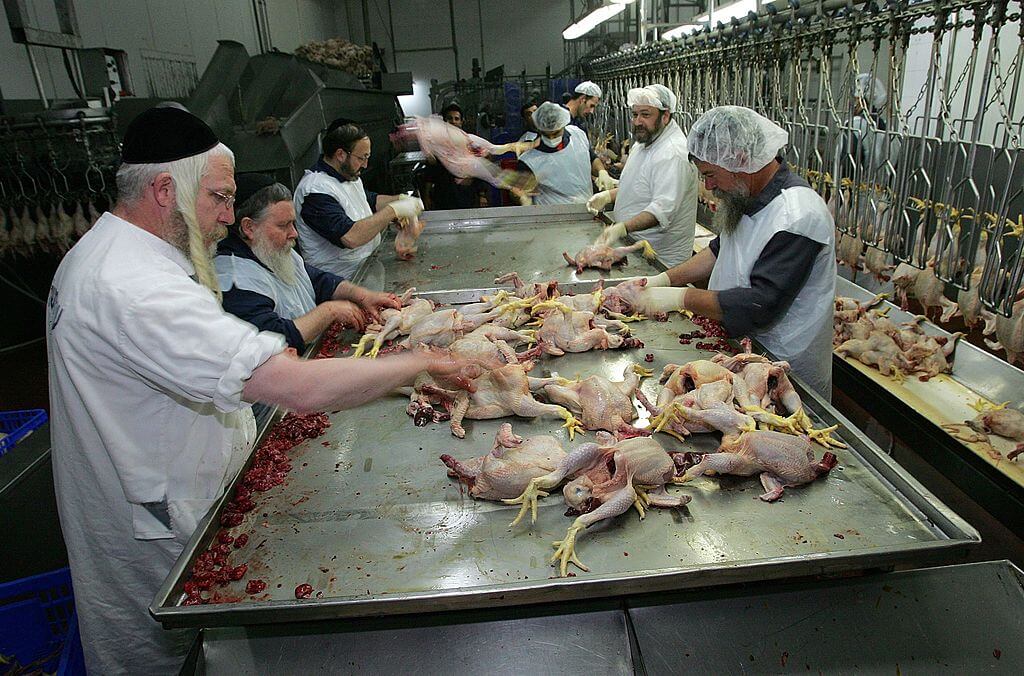Top European rights court upholds Belgian ban on kosher slaughter
The ruling dashed the hopes of Jewish advocates who had been lobbying against the bans

Chickens at a kosher slaughterhouse in Israel. Photo by Getty Images
(JTA) — The top rights court in Europe has ruled that bans of ritual slaughter in parts of Belgium can stand, ending the hopes of Jewish advocates who had said the bans were an unfair infringement on Jewish practice.
Two of Belgium’s three regions banned slaughter without stunning in 2017 and 2018, saying that the practice was cruel to animals. Stunning prior to slaughter is barred in both shechitah, Jewish ritual slaughter, and zabiha, the Muslim method for slaughtering animals for food.
In recent years, opposition to shechitah and zabiha has widened beyond animal-rights activists as right-wing parties began promoting bans as part of their agenda around reducing the presence in society of Islam, and in some cases also Judaism.
The Court of the European Union dealt Jewish community leaders a major defeat by upholding the bans in 2021. Israel’s ambassador to Belgium called the ruling “catastrophic and a blow to Jewish life in Europe.” But last year, the EU’s antisemitism envoy invited Jews and Muslims to discuss meat production with EU officials, in what some of the Jewish attendees characterized as progress toward ensuring religious freedom.
Now, the European Court of Human Rights, which is not affiliated with the EU, has dashed those hopes, upholding the bans in a ruling that closely comports with the 2021 EU ruling.
“The protection of animal welfare constitutes an ethical value to which contemporary democratic societies attach increasing importance and that should be taken into account when assessing restrictions placed on the external manifestation of religious convictions,” the court’s seven judges wrote in their opinion, which was published in French.
The ruling does not apply to all of Europe but is seen as an important precedent for other countries that might consider bans on ritual slaughter.
“Restrictions on fundamental aspects of Jewish religious freedom of expression, coupled with a background of massive increases in antisemitic attacks on Jewish communities, lead us to seriously consider whether Jews have a future in Europe,” Rabbi Ariel Muzikant, head of the European Jewish Congress, said in a statement.
“We are already seeing attempts across Europe to follow this Belgian ban, now sadly legitimized by the ECHR,” Muzicant added. “Jewish communities in Europe, now more than ever, need the protection of national governments and pan-European organisations to ensure that thousands of years of Jewish life on this continent do not come to an abrupt end.”
The bans added Belgium to a number of EU countries where ritual slaughter is illegal, including Denmark, Sweden, Finland, Estonia and Slovenia. In 2011, the Netherlands briefly joined the list, but the Dutch Senate reversed the ban in 2012, citing freedom of worship. Poland also outlawed ritual slaughter in 2013 but has since scaled back the ban to include only meat for export.
Advocates of the customs say that in addition to being required under religious law, they result in no greater suffering to animals than mechanized slaughter methods with higher malfunction rates and less attention to individual animals.
This article originally appeared on JTA.org.
A message from our CEO & publisher Rachel Fishman Feddersen
I hope you appreciated this article. Before you go, I’d like to ask you to please support the Forward’s award-winning, nonprofit journalism during this critical time.
We’ve set a goal to raise $260,000 by December 31. That’s an ambitious goal, but one that will give us the resources we need to invest in the high quality news, opinion, analysis and cultural coverage that isn’t available anywhere else.
If you feel inspired to make an impact, now is the time to give something back. Join us as a member at your most generous level.
— Rachel Fishman Feddersen, Publisher and CEO